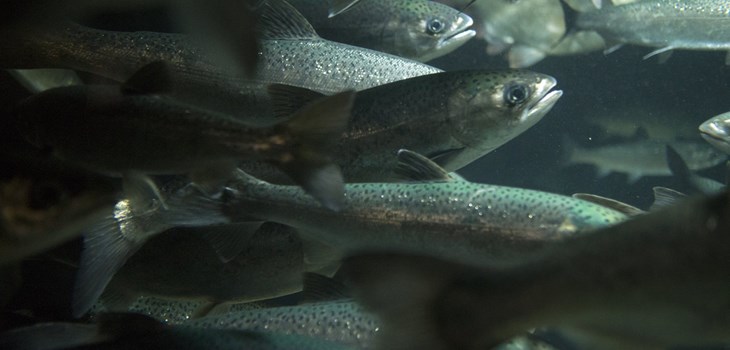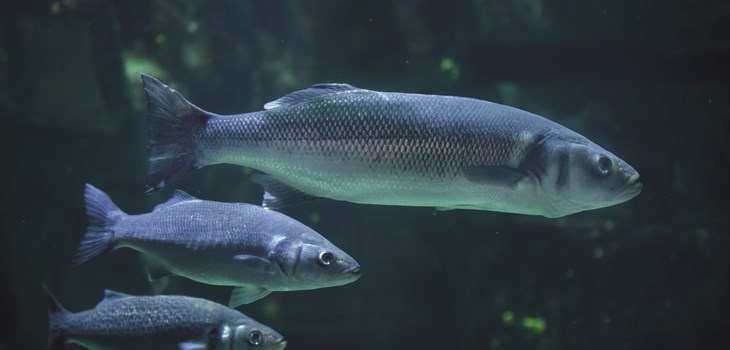Published 13/07/2020
Today, Compassion is boosting its efforts to improve the lives of the trillions of fish killed annually for human consumption, by launching phase two of its #RethinkFish campaign.

The first phase of the campaign was launched at the end of 2018, and focused on raising awareness about the sentience of fish – the fact that they can feel pain, stress, and fear, as well as experience positive emotions, social bonds, and advanced intelligence.
The next phase of the campaign launched today (13 July) urges the five major global fish certification schemes, including the Marine Stewardship Council (MSC), Aquaculture Stewardship Council (ASC), GlobalG.A.P., Friend of the Sea (FoS) and Best Aquaculture Practices (BAP), to ensure adequate standards for good fish welfare against each of the following criteria:
- Stocking density and overcrowding
- Enrichment provision
- Responsible antibiotic use
- Limiting time without feed
- Prohibiting harm to wild predators
- Humane slaughter
- Reducing demand of wild-caught fish for farmed fish feed
- Protecting welfare during capture of wild fish
These standards cover both wild-caught fish (MSC and FoS) and aquaculture fish (ASC, GlobalG.A.P., BAP and FoS).
Many consumers refer to the labels of certification schemes on fish and fish products to help guide their purchasing decisions. However, labels can be confusing as they don’t always mean the fish were reared, caught, and slaughtered humanely.
An opinion poll carried out by Compassion in World Farming and YouGov[1] in the UK found that more than 60% of participants on average are not clear whether the certification schemes protect fish welfare, and the vast majority thought that they should introduce or strengthen the welfare criteria in their standards (e.g. 77% - agreed that humane slaughter methods should be introduced/strengthened).
The standards of the five certification bodies mainly focus on the environment, human rights, and for MSC and FoS, on the sustainability of fish stocks. While this is extremely important work, more needs to be done to introduce minimum standards to protect the welfare of all fish during rearing, capture and slaughter.
We are urging fish certification schemes to introduce or enhance their standards in the following key areas:
Overcrowding
Fish stocked at high densities require more oxygen from the water and produce more waste which can affect water quality. A high stocking density can also cause aggression which can lead to injuries and stress. It can limit the space for subordinate fish to escape more dominant ones, and even affect the fishes’ ability to swim.
Certifications schemes must therefore ensure fish are stocked at a lower density which promotes their physical and mental wellbeing, providing more space to swim, reducing aggression, and allowing for better water quality.
Enrichment provision
Barren tanks, raceways and cages are not acceptable habitats for farmed fish to have a good quality of life. However, they can be enriched to give the fish more environmental complexity which can in turn reduce stress and aggression and allow them to engage more with their environment. Sea bass and sea bream, for example, habitually sift through substrates to forage and bury themselves in the sand to hide and rest, and salmonids hide themselves in rocks as protection against predators and bad weather.
It is important that each species of fish receives the right type of enrichment for each stage of its life and it should be provided in the appropriate quantity and position to help decrease stress and avoid aggression.
ASC, GlobalG.A.P. and BAP do not require the provision of enrichment in their standards, and although FoS do not currently require enrichment to be provided, they are currently working towards this.
Responsible antibiotic use
As with land animals, the routine use of antibiotics in fish farming is a symptom of poor husbandry conditions. It is a major problem as it contributes to antibiotic resistance, a huge threat to human health.
This issue is one which is somewhat regulated by the fish certification bodies. ASC and FoS prohibit the prophylactic use of antibiotics, and BAP and GlobalG.A.P. have taken steps to reduce the use of antibiotics under their schemes.
Limiting time without feed
A common practice in aquaculture is the periodical starving of fish, particularly before transport and slaughter. This ensures that their digestive systems are empty to help maintain water quality during transport and to avoid contamination with faecal matter during slaughter.
The time required for the digestive system to empty varies between species and depends on the water temperature. Usually, 48-72 hours is sufficient time to empty the gut of most farmed species, however, certification schemes permit the unnecessary prolonged starving of fish which can last for several weeks. This causes great distress, weakened fish, and can lead to aggression and serious injuries.
Prohibiting harm to wild predators
Wildlife, including predators such as seals and sea birds, are often attracted to fish farms due to the abundance of food available to them. Predators are not only a nuisance to the farmers, but they also threaten their livelihoods, so many are forced to protect their fish stock against predator attacks. Compassion recommends the use of non-lethal exclusion methods, such as nets, provided that they are designed to avoid entanglement by the predator and are checked regularly.
The majority of the global certification schemes permit the killing of predators without any regulations and give limited guidance on predator control. ASC is the only exception as they do provide some guidelines on the killing of predators.
Humane slaughter
All fish should be humanely slaughtered, meaning that they are effectively stunned, rendered instantly insensible, and remain unconscious until death supervenes.
Inhumane methods of fish slaughter, for example, by submersion in a mixture of ice and water; suffocation in air; exposure to carbon dioxide; and bleeding without pre-stunning, cause considerable pain, fear and suffering which can be prolonged. However, more humane methods of fish slaughter do exist and are being developed and adopted across the industry.
Tesco, for example, has introduced a humane slaughter system for sea bass and sea bream into commercial practice. Watch this video to find out more.
MSC and FoS currently have no guidelines for the humane capture and slaughter of wild-caught fish. In aquaculture, aspects of humane slaughter are covered by some schemes (BAP, Global G.A.P, FoS are currently developing humane slaughter standards) but they need to be strengthened by providing effective specific guidelines for all species of fish.
Wild-caught fish for farmed fish feed
In aquaculture, many carnivorous species such as salmon are fed on wild-caught fish, and the fishmeal industry accounts for 0.5-1 trillion fish out of the 0.79-2.3 trillion fish caught every year. This is inherently unsustainable as it is causing a global crisis in overfishing and depleting the feeding grounds for many species including sea birds and marine mammals.
Certification schemes need to tackle this issue and help reduce the amount of wild-caught fish being used as fish feed by promoting alternative feed sources.
Moving forwards

An increasing number of consumers are already beginning to question the welfare of fish and the impact modern aquaculture and overfishing is having on the environment.
Although there are many challenges facing the fishing industry, we all need to work together to ensure that all fish farmed for food are humanely and sustainably produced, we need to reduce the amount of wild-caught fish being used as fish feed, and make higher welfare fish products more easily identifiable on shelf.
Fish Resources
View our fish labelling schemes comparison table here.
Read more about the welfare needs of the most commonly farmed fish species here.
[1] All figures, unless otherwise stated, are from YouGov Plc. Total sample size was 2,137 adults. Fieldwork was undertaken between 5th - 6th May 2020. The survey was carried out online. The figures have been weighted and are representative of all UK adults (aged 18+). All calculations produced the Compassion in World Farming team.